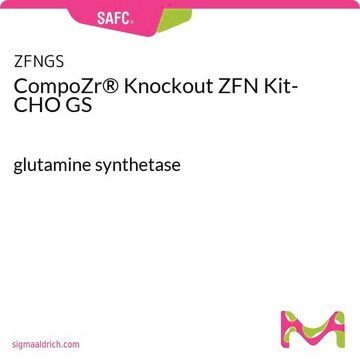ZFNDHFR
CompoZr® Knockout ZFN Kit- CHO DHFR
dihydrofolate reductase
Synonym(s):
CompoZr® Knockout ZFN Kit for CHO Cells
About This Item
Recommended Products
Looking for similar products? Visit Product Comparison Guide
General description
Physical form
Legal Information
Storage Class Code
10 - Combustible liquids
Flash Point(F)
Not applicable
Flash Point(C)
Not applicable
Choose from one of the most recent versions:
Certificates of Analysis (COA)
Don't see the Right Version?
If you require a particular version, you can look up a specific certificate by the Lot or Batch number.
Already Own This Product?
Find documentation for the products that you have recently purchased in the Document Library.
Articles
MGAT1 adds N-acetylglucosamine to the Man5GlcNAc2 (Man5) structure. Goh et al. reported increased sialylation after restoring MGAT1 function in MGAT1 deficient CHO cells.
A signal peptide is a 5-30 amino acid (aa) peptide present at the N-terminus of secretory proteins.
In the present study, we have identifi ed species-specifi c housekeeping genes (HKGs) for Chinese Hamster Ovary (CHO) cells using data from microarray gene expression profiling.
Related Content
Learn more about cell line development and the relevant products you need for this process.
Our team of scientists has experience in all areas of research including Life Science, Material Science, Chemical Synthesis, Chromatography, Analytical and many others.
Contact Technical Service






